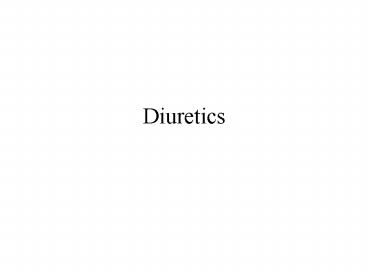Diuretics - PowerPoint PPT Presentation
1 / 17
Title:
Diuretics
Description:
Diuretics Why do we want to know about diuretics? What do kidneys do? What can go wrong? Interventions that can be used how do they work? Effects, side effects ... – PowerPoint PPT presentation
Number of Views:135
Avg rating:3.0/5.0
Title: Diuretics
1
Diuretics
2
Why do we want to know about diuretics?
- What do kidneys do?
- What can go wrong?
- Interventions that can be used
- how do they work?
- Effects, side effects
3
Functions of the kidney?
- Excretion of waste products
- regulation of salt and electrolyte content
- and volume of extra -cellular fluid
- acid -base balance
4
How?
- Several hundred litres of plasma filtered/day
- filtrate - very little protein/protein bound
substances - 99 of sodium is reabsorbed, some substances
secreted - 1.5 litres voided as urine
- Diuretics increase salt and water excretion
5
Why diuretics?
- important group of drugs employed for their
effects on the kidney to enhance salt and water
excretion (only when needed) - when used heart failure, other causes of salt
and water retention (renal failure, liver
failure), hypertension
6
Variety of compounds with diuretic activity
- Xanthines - theophylline, caffeine
- osmotic diuretics - urea
- carbonic-anhydrase inhibitors
- thiazides
- loop diuretics
- aldosterone antagonists
- potassium sparing diuretics
7
How do they work?
- Direct effect on cells of the nephron..
- where most of the active and selective solute
reabsorption occurs - ascending loop of Henle
- early distal tubule
- collecting tubules and ducts
- OR
- modifying the content of the filtrate by their
presence
8
Loop diuretics (Rang and Dale p361-363)
- Frusemide, bumetanide, piretanide
- act on thick segment of ascending loop
- inhibit NaCl transport OUT of tubule by
inhibiting Na/K/2Cl- carrier (co-transporter)
in luminal membrane ( acting on chloride binding
site) - Reduces the hypertonic interstitial area in the
medull, so reducing water re-absorption - increases Na solute concentration in the distal
tubule which is exchanged for K and H
(hypokalemia and alkalosis) - Can increase the excreted sodium from 1 to 15
of filtrate - Also reduce peripheral vascular resistance
9
Loop diuretics
- Kinetics
- oral and IV preparations
- bound to plasma protein, secreted into tubule
- metabolised by the liver ( P450)
- act within 1 hour
- half life about 90 minutes longer in renal
failure - duration - 3-6 hours (Lasts Six Hours Lasix)
10
Loop diuretics
- Effects
- pass urine in large amounts!
- Side effects
- electrolyte depletion
- Hypovolemia
- other reactions rare
- Main Use
- Heart failure particularly acute left
ventricular failure - Hepatic cirrhosis
- Nephrotic syndrome
- Renal failure
11
thiazide diuretics
- bendrofluazide, hydrochlorothiazide, indapamide
- act on distal convoluted tubule
- bind to chloride site of Na/Cl cotransport
system and inhibit action - decrease active Na resorption
- decrease water resorption
- changes in Ca, magnesium and uric acid
12
thiazide diuretcis
- kinetics
- rapidly absorbed orally
- secreted into the tubule
- maximal effect 4- 6 hours, duration 8-12 hours
13
thiazide diuretics
- effects
- increase urine output
- side effects
- electrolyte disturbances
- increased cholesterol
- impotence
- hypersensitivity reactions (rare)
- Main uses
- hypertension
- mild heart failure
14
aldosterone antagonists
- spirololactone
- inhibits action of aldosterone (intracellular
receptor binding anatagonism), increases sodium
and decreases potassium secretion - kinetics
- well absorbed orally, active metabolite half life
of 16 hours - effects
- limited diuresis
- Main uses heart failure and cirrhosis
- side effects
- Hyperkalemia, estrogen like effects
15
other potassium sparing diuretics
- Triamterene, amiloride
- act on collecting ducts
- inhibit Na resorption, decrease potassium
excretion - effects
- limited diuresis
- side effects
- electrolyte disturbances
16
clinical choices
- Uses
- cardiac failure
- hypertension
- fluid overload
- NOT for everyone with oedema (eg from venous
insufficiency) - acute versus chronic
- evidence of benefit
17
references
- Rang Dale, 5th edition
- Cardiovascular Therapeutic Guidelines
- Australian Medicines Handbook































